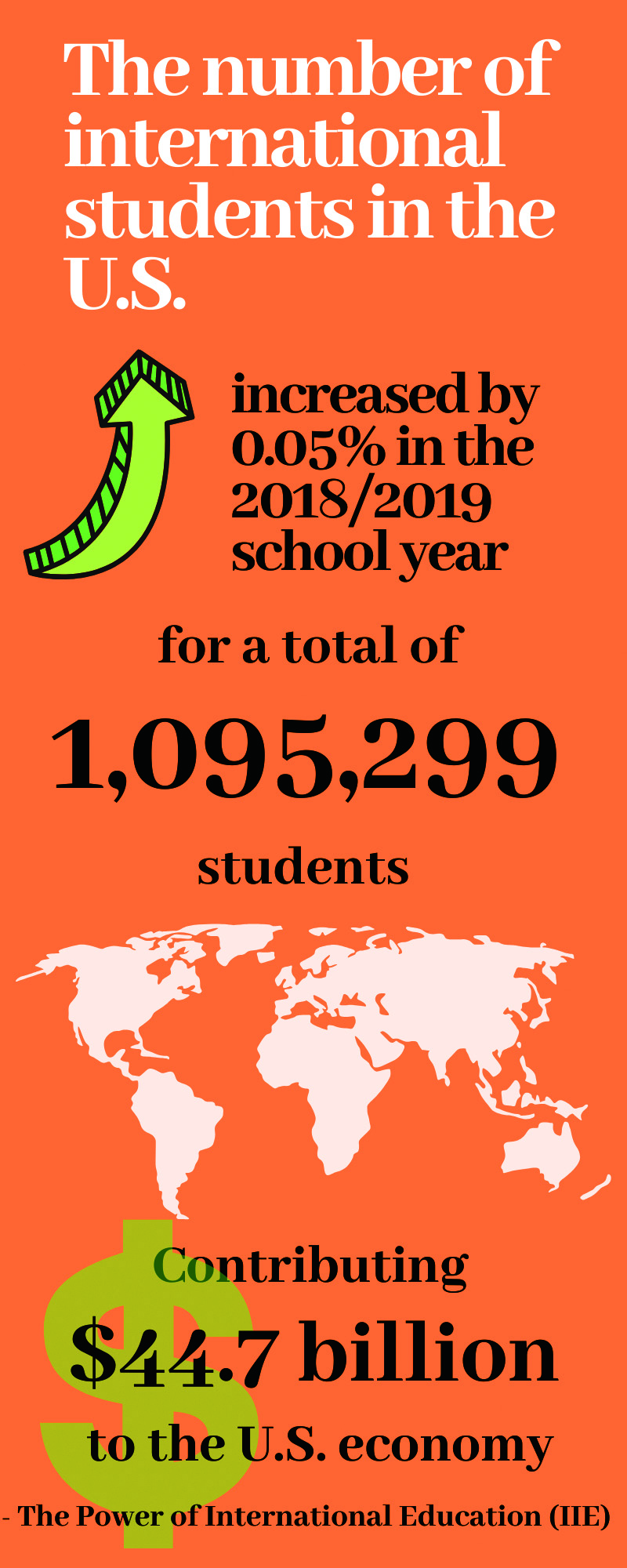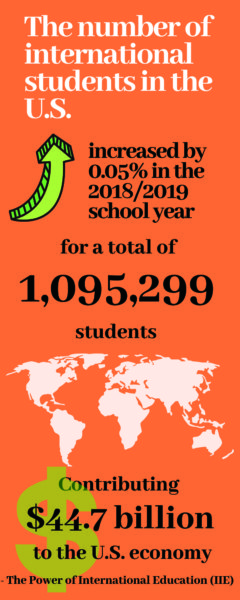
Dennis Fasnacht
Basel, Switzerland

What’s the most difficult part about moving to a new country?
I think for me it’s … to develop the habit of living. Here, everything’s timed differently, [like] … school, sports and family life. [During] the week, [Americans] spend more time together because you basically live in the living room while us Europeans … we are kind of in our room [most of the day], and then we eat together. But besides that we don’t really do stuff [together].
Do you have any times when you struggled with the language barrier?
[My friends and I] joke all the time about language barriers, but it’s not that big of a problem. I can express what I want and understand what other people want. One common thing is that if people don’t speak clearly, [I] can’t really guess what they say. I can do it in German, but I can’t do it in English. So I have to ask a second time a lot. Then there’s just a couple of words [I don’t know,] but usually people understand that I don’t know them and they’ll just tell me [the meaning].
Do you have any times where you experienced culture shock?
Christmas was interesting, but I don’t think there’s that big of a cultural difference. It’s just because the family I’m staying with … had a big family reunion and there [were] like 40 people. That was pretty crazy. Everyone got together and they’re all from different parts of the country. I’ve met [a lot of] the new people. I’ve [met] maybe [only] a couple [of] … them before, and like you just kind of [feel] like you [are] welcomed into the family and that you’re kind of part of it even though you don’t know the people actually. That was a beautiful experience.
Are there any differences between schools in America and schools in Switzerland?
There’s a big difference. Here … you have all the periods [in one day]. [Switzerland] has nine [to] 10 depending on what year you’re in, and you don’t have every class everyday. Some days you only have three classes, [while] other days you have five classes. Sometimes you have the afternoon off. Sometimes you go late to school. There’s a lot more variety to school [days in Switzerland]. … [Additionally], there [are] no real extracurriculars [in Switzerland]. Sports aren’t tied to the school. Most schools over in Switzerland are like that. There [are] some private schools that are different, but sports and other extracurriculars are [usually] all through clubs. There’s not really that same spirit as here. … Over here, [teachers] are more caring about what you do at school and that you participate, while with us, our teachers used to be like that [when we] were younger, but now they’re just like, “You have to do it yourself. If you don’t do it, that’s your problem.” I feel like it’s just that [Swiss] people want to go to school and want to do well, so it also comes a lot easier to them [than Americans]. [But] I’d say overall classes are about the same.
Do you recommend being an international student?
I definitely recommend [it]. You have to be somewhat lucky with the [host] family, but usually, most families that are going to [provide] that experience are open and more tolerant. … It’s hard to imagine and sometimes it still hits me like, wow, I’m gone for a year. I’m away from everyone I grew up with, but overall, it’s an amazing experience … If people have the idea of doing [foreign exchange], I would really encourage them to do it. Because you can really only learn from it, even if it’s not the optimal fit at first. You learn a lot about yourself and, of course, a new culture, a new language.

Rintaro Okuda
Hiroshima, Japan

Why did you want to be an international student in America?
I want to learn English and I want to [teach about] the [Japanese] atomic [bombings] to people who don’t know about [them]. I want to speak English more well. … I have asthma and I was treated by doctors [so] … I want to be a pediatrician [and] help children in the world. … I want to learn English so I can work [with] Doctors Without Borders … [and many doctors speak English]. If I [learn English], I can talk to [other-country people’s] and exchange our [thoughts] or feelings [better].
What are the differences between schools in Japan and America?
[In Japan], we have clubs everyday after school. I joined the tennis team, so we [practiced everyday] after school, but American high schools don’t have clubs everyday. [Also], Japanese high [schools stay in one] classroom [for a class], but American high schools [have] no [permanent] classrooms; the students move [to] the teacher’s classroom for a class. Japanese high school is [also] more formal than American [high schools]. I like American style [schools] because we don’t have to wear a uniform, but it is easy for me to wear school uniforms because we don’t have to choose [different] clothes every day. … In Japan we don’t have Spanish or Chinese. … We don’t get choices for language, just English.
Is the college process different in Japan?
We have one big test at the end of high school. We only take this test one time [to get into college]. [There is] math, Japanese, English, science, social studies, all subjects [you learn at school]. [The test] is two days, eight hours for each day.
Did your view about America change after coming here?
I thought [that] America is [a] more dangerous country before coming here, but it’s not true. [This is because] there is [a lot of] gun news in Japan. … We don’t have guns in Japan and I was worried that American people could buy [guns] and use it [at school].
Additional reporting by Vedant Gaur




